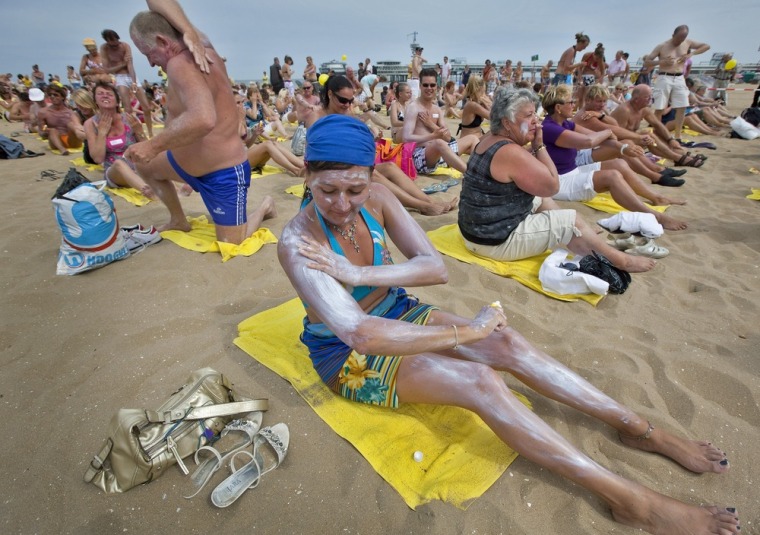If fear of skin cancer doesn't persuade you to slather on the sunscreen, maybe vanity will.
Daily use of sunscreen significantly slows the aging of skin caused by the sun's ultraviolet rays, according to the first rigorous study of its kind.
Australian researchers found that when adults regularly used broad spectrum sunscreen - which protects against both ultraviolet B and ultraviolet A rays -- they were less likely to show increased wrinkling over a four-and-a-half-year period than adults who used sunscreen less often.
"We weren't surprised by the findings, but we now have the science to back it up," says Adele Green, a senior scientist at the Queensland Institute of Medical Research and lead author of the randomized, controlled trial -- considered the gold standard of scientific research -- published Monday in Annals of Internal Medicine, in an email to NBC News.
Previously, the only scientific evidence for the beneficial effects of sun screen on wrinkling was in hairless mice.
The researchers randomly assigned 903 adults, ages 25-55, to use a broad spectrum sunscreen every day with frequent reapplications or to use sunscreen at their discretion.
The adults using daily sunscreen were 24 percent less likely to show increased aging, according to the study. Regardless of sex, age, skin color, occupation, skin cancer history, weight and smoking, everyone benefitted from daily sunscreen use.
The sunscreen in the study had a sun protection factor, or SPF, of 15. Anything stronger might have had only a marginal additional effect, says Green. A sunscreen with an SPF 15 blocks about 94 percent of ultraviolet B rays, which are responsible for sunburn, while one with an SPF of 40 filters about 97.5 percent.
"The more important issue is applying the sunscreen well and reapplying it often," says Green.
Past studies have shown that people who use sunscreen can be lulled into a false sense of safety, staying out longer in the sun without applying sunscreen properly.
"The sunscreen has to be applied thick enough and in all areas to be effective," says Dr. Thomas Ruenger, a professor of dermatology at Boston University. Ruenger, who recently published a study showing UV rays induce skin cells to express and accumulate a protein associated with premature aging, recommends using a sunscreen with an SPF of 20 or 30 and reapplying every two hours and after sweating or bathing.
The broad spectrum sunscreen in the Australian study protected against both ultraviolet B rays and ultraviolet A rays, which penetrate deeper and cause skin damage. Dermatologists now think that both types of rays cause the skin to age, Ruenger says.
"You have to protect yourself against both UVA and UVB, and so I recommend people use a sunscreen labeled broad spectrum," says Ruenger.
Many sunscreens on the market protect only against UVB rays.
If you can't stay out of the sun, Reunger recommends covering up with long sleeves, a brimmed hat and long pants and using sunscreen for exposed parts of the body.
Daily sunscreen use can also reduce skin cancers, says Green.
"It means a significant decrease in squamous cell carcinoma and melanoma," she says, according to earlier published results from a randomized, controlled study by the Australian researchers.
The current study also randomly assigned participants to take an oral supplement of beta-carotene or a placebo to test a belief among some consumers that anti-oxidants can keep skin young. However, no difference in skin aging was observed.
The study was supported by the Australian government, Ross Cosmetics of Australia, and Roche Vitamins and Fine Chemicals of New Jersey.
